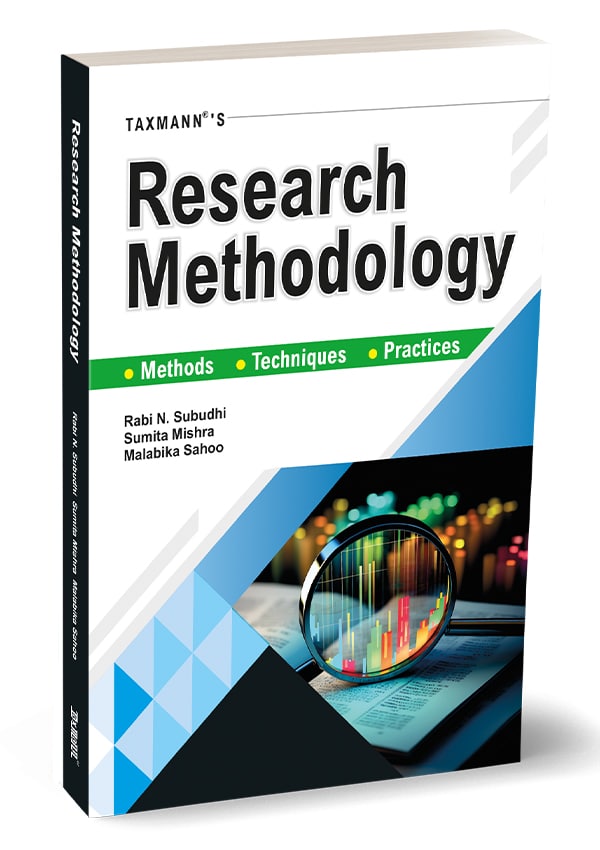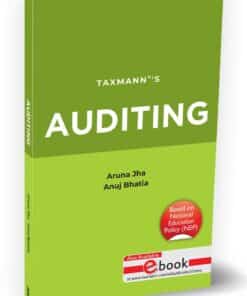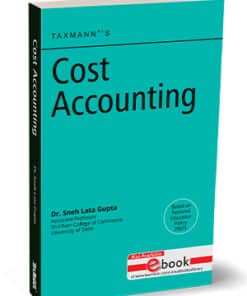- Binding : Paperback
- Publisher : Taxmann
- Author : Rabi Narayan Subudhi, Sumita Mishra, Malabika Sahoo
- Edition : 1st Edition 2024
- Language : English
- ISBN-10 : 9789357787215
- ISBN-13 : 9789357787215
Taxmann’s Research Methodology – Methods | Techniques | Practices by Rabi Narayan Subudhi
₹460.00 Original price was: ₹460.00.₹391.00Current price is: ₹391.00.
Taxmann’s Research Methodology – Methods | Techniques | Practices by Rabi Narayan Subudhi – 1st Edition 2024. This textbook simplifies and enriches research methodologies for management students and doctoral scholars authored by seasoned educators. It addresses the unique needs of Indian students by integrating relevant examples and case studies. Structured into four parts, it covers the basics of scientific research, quantitative and qualitative research foundations, and report writing. Pedagogical elements include clear learning outcomes, real-world examples, boxed summarisations, key terms, review questions, and practical demonstrations in SPSS and Excel. The book’s clear and straightforward writing style makes complex ideas accessible without compromising depth.
10 in stock
Taxmann’s Research Methodology – Methods | Techniques | Practices by Rabi Narayan Subudhi – 1st Edition 2024.
Taxmann’s Research Methodology – Methods | Techniques | Practices by Rabi Narayan Subudhi – 1st Edition 2024.
Description
This textbook aims to simplify and enrich the study of research methodologies for students and doctoral scholars in management. Authored by a team of seasoned educators with extensive experience teaching business research methods at various academic levels, the book embodies their collective effort to demystify the complexities of management research and present them in an engaging and accessible manner.
What sets this textbook apart is its strong focus on the Indian context, addressing the unique needs and challenges faced by students and researchers in India. The authors integrate examples, case studies, and scenarios specific to the Indian research environment, making the book particularly relevant and helpful for Indian students and researchers. This localised focus ensures readers can easily relate theoretical concepts to real-world applications within the Indian setting.
The Present Publication is the Latest Edition, authored by Rabi N. Subudhi, Sumita Mishra, and Malabika Sahoo. The pedagogical elements of the book are as follows:
- [Learning Outcomes] Each chapter begins with clearly defined learning outcomes. These outcomes provide an overview of the chapter’s content and set expectations for the reader, guiding their learning journey from the outset
- [Lucid Examples] The book includes numerous examples from real-world scenarios to illustrate complex concepts. These examples help bridge the gap between theory and practice, making abstract ideas more tangible and easier to understand
- [Boxed Summarisations] Each chapter presents key points and summaries in text boxes. These boxed summarisations offer quick and easy reference, allowing readers to review important concepts at a glance
- [Key Terms] At the end of each chapter, key terms are highlighted and defined. These terms are also indexed at the back of the book, providing a handy reference tool for readers
- [Review Questions and Exercises] Each chapter includes multiple-choice questions reinforcing key concepts and terms. Additionally, explanatory and application-based questions challenge readers to apply their knowledge in simulated business situations, fostering more profound understanding and retention
- [Demonstrations in SPSS and Excel] Recognising the importance of data analysis in management research, the book includes demonstrations of quantitative data analysis techniques using SPSS and Microsoft Excel. These demonstrations provide practical, hands-on experience with the tools and methods discussed in the text
- [Clear and Simple Writing] One of the book’s greatest strengths is its clear and straightforward writing style. The authors have taken great care to present complex ideas straightforwardly and understandably, making the book accessible to a broad audience without compromising on depth or rigour
The contents of the book are as follows:
- [Understanding the Basics of Scientific Research in Management] This introductory chapter lays the foundation by exploring the importance and nature of scientific research, various types of research, and essential terminologies. It concludes with a summary, key terms, multiple-choice questions, descriptive questions, and a bibliography for further reading
- [Research Design and Process] Analysing the steps of the research process, this chapter covers different research designs, helping readers to formulate and plan their research projects effectively
- [Review of Literature] This chapter provides comprehensive guidance on conducting a literature review, including organising literature, identifying research gaps, understanding citation styles, and addressing plagiarism concerns
- [Foundations of Quantitative Research] This chapter introduces readers to fundamental statistical techniques such as univariate and bivariate analysis, t-tests, chi-square tests, correlation, and regression, with practical examples and exercises
- [Measurement of Constructs] This chapter focuses on the concepts, constructs, and variables essential for measurement in research, including various scaling techniques and levels of scale measurement
- [Understanding Reliability and Validity] This chapter discusses the critical aspects of ensuring the reliability and validity of research instruments, highlighting the importance of these concepts in producing credible research findings
- [Sampling for Quantitative Research] This chapter covers the principles and stages of sampling, different sampling techniques, and errors in sampling, providing a solid understanding of how to select and manage samples effectively
- [Questionnaire Designing] This chapter provides a step-by-step guide to designing effective questionnaires, discussing types, purposes, and best practices for creating reliable and valid data collection tools
- [Testing of Hypothesis] This chapter explains the concepts and methods of hypothesis testing, including statistical hypothesis, types of hypothesis tests, and practical application-oriented examples
- [Basic Quantitative Data Analysis] This chapter guides the readers through data processing, editing, and various statistical analyses using software tools like SPSS and Excel, ensuring they can handle data effectively
- [Advanced Quantitative Data Analysis] This chapter discusses more complex statistical techniques such as multiple correlation, multiple regression, and logistic regression, providing advanced tools for sophisticated data analysis
- [Foundations of Qualitative Research] This chapter introduces qualitative research paradigms, key characteristics, and processes, ensuring a robust understanding of qualitative methodologies
- [Sampling for Qualitative Research] This chapter discusses qualitative sampling techniques, with a focus on purposive sampling, theoretical sampling, and their practical applications
- [Qualitative Research Interviews] This chapter details the process of conducting in-depth qualitative interviews, including preparation, types of interviews, question typology, and ensuring reliability and validity
- [Qualitative Data Analysis | Grounded Theory] This chapter explains grounded theory methodology, including coding processes, memos, and the overall procedure, with an emphasis on practical application
- [Qualitative Data Analysis | Case Studies] This chapter focuses on case study research design, data collection, and analysis, ensuring readers can effectively use case studies in their research
- [Report Writing and Presentation] This chapter provides guidelines for preparing and presenting research reports, covering structure, qualities of an excellent report, and effective oral presentation techniques.
Details
| Publisher | |
|---|---|
| Language | |
| Author |
Be the first to review “Taxmann’s Research Methodology – Methods | Techniques | Practices by Rabi Narayan Subudhi” Cancel reply
Related products
B.Com
Taxmann’s Students Guide To GST & Customs Law by Vinod K Singhania – 12th Edition January 2024













Reviews
There are no reviews yet.